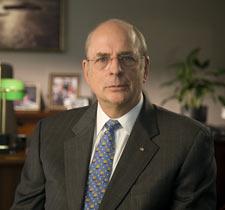
The current state of U.S. science and engineering is one of Norman Augustine's favorite topics. In 2005, he served as chair on a National Academies committee to assess the U.S. economy of the 21st century. The committee prepared a report, Rising above the Gathering Storm, in which all 20 members agreed that U.S. science and engineering was at a crossroads - the country would soon lose its technological lead unless dramatic steps were taken to encourage and fund more science education and research. He has spoken on the topic in front of U.S. congressional representatives and at universities around the country. As someone who constantly helped keep the U.S. competitive through his career in both aerospace engineering and in government, Augustine has certainly done his part to maintain that edge.
In the cut throat world of U.S. business, few leaders manage to simultaneously steer their company to success while also keeping an eye towards helping the public. Augustine is cited as often for being the National President of the Boy Scouts as he is for overseeing the merger of Martin Marietta and Lockheed in 1995. Born in 1935 in Denver to hardworking parents and a father who was "the most honest man" Augustine says he ever knew, Augustine was driven to succeed, and to do so ethically, from a very young age.
Augustine earned his undergraduate degree (1957) and his masters (1959) in aeronautical engineering from Princeton University. He worked for Douglas Aircraft Company for several years, and began his first government stint in 1965, working in the Pentagon under Secretary of Defense Robert McNamara. Between turns in industry, Augustine returned to government - in 1973 as Assistant Secretary of the Army, 1975 as Undersecretary, and later as Acting Secretary. In 1977, he joined Martin Marietta as president, later becoming COO and then CEO, before assuming the presidency of Lockheed Martin. After the merger in 1995, he became CEO of the company. Although he retired in 1997, Augustine still serves on the board of Lockheed Martin. Until 1999, he also served as a professor at his alma mater, Princeton.
In addition to his many speeches on science in the U.S., Augustine is famously outspoken on the subject of ethics. He distinguishes between that which is legal and that which is "right." Hostile takeovers may be legal in the U.S., for example, but he doesn't believe they're ethical.
Incorporating ethical standards with his support of science and engineering and his brilliant business acumen has earned Augustine over 50 major awards including the National Medal of Technology awarded by the President of the United States and the Defense Department's highest civilian honor, the Distinguished Service Medal, which he has been awarded five times. Augustine served as chairman and principal officer of the American Red Cross for nine years and as chairman of the National Academy of Engineering (NAE). He is a member of the President's Council of Advisors on Science and Technology and the Advisory Board to the Department of Homeland Security and was a member of the Hart/Rudman Commission on National Security. He is the author of two books, Augustine's Laws and Augustine's Travels, and the co-author of The Defense Revolution and Shakespeare In Charge.
Information as of April 2007

